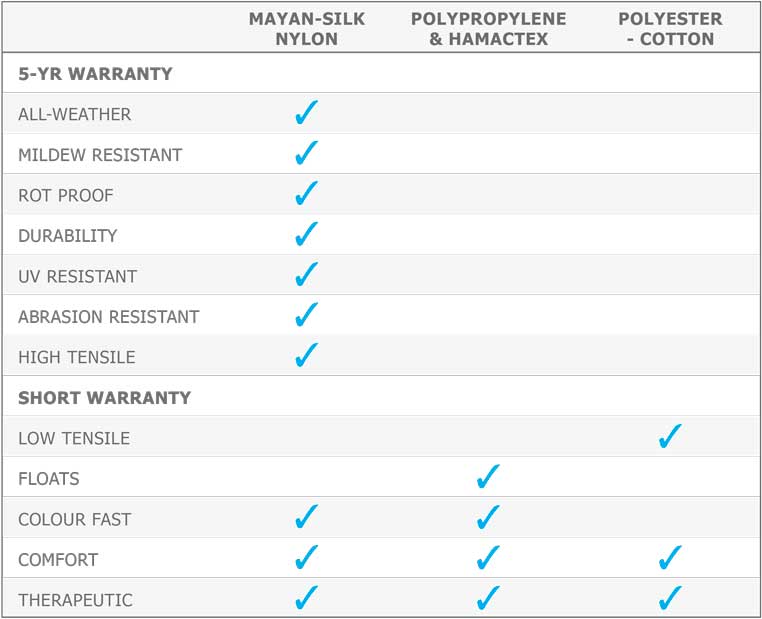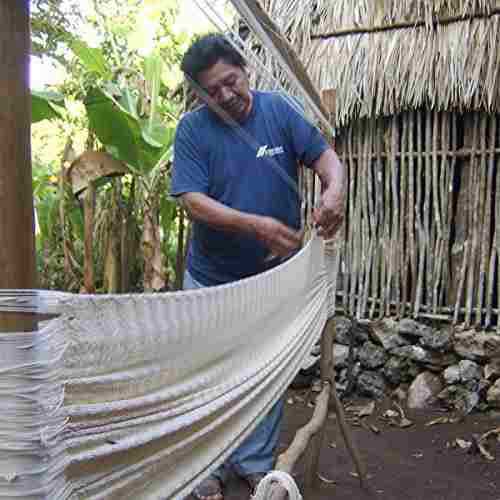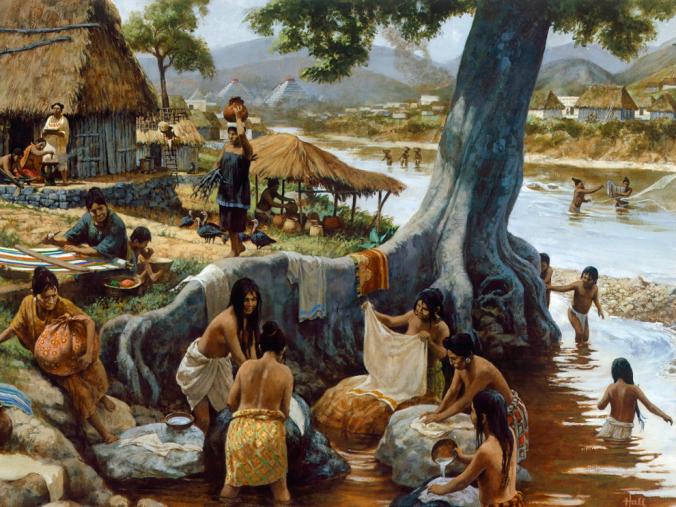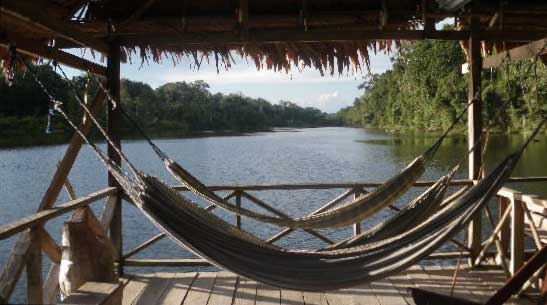Nylon Hammocks • Mildew & Rot Free with 5yr Warranty
Weatherproof Hammocks that won’t let you down!
Hammock World is the only supplier of genuine Nylon netting hammocks in New Zealand. Authentic-Nylon hammocks are known as Mayan Silk Hammocks. We use genuine nylon yarn for the manufacture of our outdoor netting hammocks and can thereby offer an extended 5-year All Weather Warranty.
HAMMOCK FIBRE
COMPARISON CHART

Caution - Customers are being deceived by businesses selling inferior 'polypropylene' hammocks masquerading as 'nylon' hammocks, so purchase wisely!
Outdoor Hammocks need to be made with a good quality 'all weather' fibre, in order to withstand the ravages of weather - UV (ultra-violet) deterioration and rain, which will cause mildew and rot to occur in any outdoor environment over time. Authentic-Nylon is an 'all weather' fibre used extensively throughout the marine industry, because it withstands sun, salt and water extremely well.
Authentic-Nylon is exceptionally strong and durable, and has the highest tensile strength of any fibre suitable for the manufacture of outdoor hammocks. Authentic-Nylon has good resistance to abrasion and excellent UV stability, and will out-last natural fibres by 4-5 times.
You would not use 'cotton' or 'polypropylene' rope to tie a Superyacht to a marina. Of course not - you would use genuine nylon rope! The following research will provide the correct information to enable you to make a wise informed decision when purchasing your outdoor hammock.
Discerning Buyers and connoisseurs of hammocks need to be aware that not all 'nylon' hammocks are the same! This research will reveal that so-called nylon hammocks are being made with an inferior polypropylene fibre, while genuine-nylon are known as 'silk' hammocks!
The majority of hammocks sold in New Zealand are imported from Central America, which has no consumer protection. Mexico makes hammocks with an inferior, less expensive polypropylene fibre, but these hammocks are sold in New Zealand as 'nylon hammocks' in order to gain an inflated price from unsuspecting buyers.
This is made possible, because the two synthetic yarns - 'nylon' and 'polypropylene', look similar when spun and made into netting hammocks, but these two fibres are vastly different in quality and grade. This visual similarity allows importers and distributers of 'polypropylene' hammocks to market these inferior hammocks in New Zealand as 'nylon hammocks' in order to mislead the customer for commercial gain.
New Zealand has advertising standards and a consumer protection Code of Ethics that requires the truthful presentation of product advertising, with no false or misleading representation which is likely to abuse the trust of the consumer or exploit his or her lack of knowledge.

Mayan artisan hand-weaving our Outdoor Hammocks using genuine Nylon fibre

Mayan Village Life – Courtesy Tom Hall National Geographic
Customers need protection from hammock suppliers lacking Integrity. As a customer you are entitled to truthful information in order to make an informed decision before purchasing your outdoor hammock. The following questions are suggested for customer protection, to encourage suppliers of so-called 'nylon' hammocks to provide honest product information.
Q. What is the legitimate name for the synthetic fibre used to make the hammock?
A. "Genuine Nylon, known as Mayan Silk"
Q. What is the length of the outdoor warranty offered with the hammock?
A. "An Outdoor Guarantee of 5-years" (minimum)
Polypropylene is the cheap plastic twine sold in $2 shops - this is why so-called 'nylon' hammocks can be offered for the equivalent price of cotton hammocks!
Our experience has shown that polypropylene, commonly known as 'polyprop' is not a reliable synthetic fibre for outdoor hammocks. Polyprop is affected by sunlight deterioration more than any other synthetic or natural fibre and will not withstand the harsh outdoor conditions experienced in New Zealand. As a consequence of these lesser qualities, polypropylene is the least suitable fibre for the manufacture of outdoor hammocks.
Silk - The name became synonymous with 'nylon' after the commercial success of nylon womens hosiery! Before the second world war, all womens hosiery was made using natural silk from silk worms, but as the demand for this immensely strong natural fibre increased and outstripped supply, a synthetic polymer was developed to replace silk for womens hosiery. The first nylon stockings came onto the market in 1937 and by 1941 over 60 million pairs of sheer nylon stockings had been made - more than the number of women in the United States at that time!
Nylon - The name was never trademarked and remained generic. Today 'nylon' is used to sell inferior quality 'polypropylene' hammocks, masquerading as nylon hammocks - telling the difference between all weather nylon fibre and the less durable polypropylene fibre is not easy for the layperson. It is essential therefore, to purchase your outdoor hammocks from a supplier with integrity.
Travel Hammocks, such as our Ticket To The Moon Hammocks are made from an immensely strong, breathable, lightweight, expandable, genuine-nylon.
Cotton Hammocks are unsuitable for outdoor use, where mildew and rot will eventually occur in any damp environment. Cotton is a natural 'plant' fibre produced from cotton plants and is therefore not an outdoor fibre - you wouldn't put 'cotton' tires on a vehicle! Cotton hammocks are only suitable for indoor or sheltered outdoor use, see - Cotton Hammock Care
Hammocks used throughout Central and South America are traditionally made with cotton, but hung 'indoors' from overhead beams and protected from the weather under extended roofing.

Amazon Hammocks - Photo Courtesy 'Reserva Marasha Amazonas' Colombia



